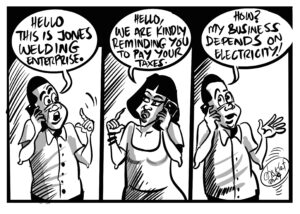A total of 1,069 cases of human rights violations were identified in correctional facilities from August last year to August, 2018, says Human Rights Commission (HRC) chairperson Mudford Mwandenga.
And Zambia Correctional Facilities Commissioner General Percy Chato says surveys conducted in 2011 had indicated that sodomy existed in facilities causing 27.4 per cent HIV prevalence rates.
Speaking at the dissemination meeting of the findings of investigations in detention and correctional facilities at Radisson Blu hotel yesterday, Mwandenga said the violation cases were related to delayed trials, delayed committal orders and delayed judgement, among others.
“To this effect, the investigations focused on, but not limited to, the delayed trials; delayed committal order; delayed consent to prosecute; delayed judgements; delayed sentencing and delayed appeal cases. The Commission also assessed factors relating to difficulties in accessing bail and maladministration of justice for persons in detention as well as matters relating to deportation and removal orders for foreign nationals in Zambia’s detention facilities. Further, the Commission investigated matters related to delayed conveyance of juveniles to appropriate facilities; delayed confirmation orders for juveniles by the High Court and delayed social welfare reports on matters before the courts of law concerning juveniles,” Mwandenga said.
He said after the Commission’s intervention, a total of 532 cases were successfully resolved.
“The investigations were undertaken in selected facilities in all the 10 provinces of Zambia and a total number of 1,069 cases of human rights violations were identified. The provincial distributions of cases were as follows: 249 (Lusaka); 158 (Copperbelt); 147 (Central); 100 (Luapula); 82 (Western); 77 (Eastern); 67 (North-Western); 66 (Northern); 63 (Muchinga) and 60 (Southern). The nature of the 1,069 identified cases of human rights violations were relating to the following: delayed trials (325); delayed confirmation of orders for juveniles (110); right to apply for bail (108); delayed committal certificates (95); delayed appeals (95); delayed conveyance of juveniles (91); delayed sentencing (66); delayed judgements (59); delayed cause listing (45); maladministration of justice (27); delayed deportation and removal of foreign nationals from detention (27); delayed social welfare reports (14) and delayed consent to prosecute (7),” Mwandenga disclosed.
“These cases of violations were of grave concern to the Commission and we immediately engaged the respective duty bearers in the criminal justice system to redress the situation. Following the Commission’s intervention, a total of 532 cases were successfully resolved, representing about 50 per cent success rate of redressing the identified human rights violations. The Commission will continue monitoring efforts towards resolving the outstanding cases while the monitoring of detention and correctional facilities is an on-going activity of the Commission.”
And Mwandenga revealed that delayed trial is the leading factor hindering enhanced access to justice.
“It is clear from the findings that delayed trial is leading factor among many other factors hindering enhanced access to justice. Therefore, it is strongly recommended that: All the players in the criminal justice system must play their respective roles effectively and efficiently to afford suspects a speedy and fair hearing or trial in accordance with the law. In cases where the judge or magistrate handling a matter has been transferred, the Judiciary should urgently put in place administrative stop-gap measures to ensure that trials are not adversely affected; in places where there are no magistrates stationed at the district or where accused persons must be moved to other districts for trial, resources must be put in place to facilitate trials; subordinate courts must treat all matters relating to the transmission of records and orders for confirmation by the High Court with a sense of urgency to safeguard the best interests of the child and justice; and further, the High Court should treat the review of records, relating to juveniles, and confirmation of orders, with the utmost urgency they require,” Mwandenga said.
He further appealed to the Judiciary to relax bail conditions and promote the presumption of innocence.
“The Commission calls upon the Judiciary to relax bail conditions and promote the presumption of innocence. Conditions imposed should only be meant to secure the attendance of an accused person in court at the appointed place, date and time. The stringent bail conditions imposed on some suspects amount to denial of the constitutional right to bail and must be stopped because they are a violation of human rights and inimical to the rule of law. The Commission urges the National Prosecutions Authority (NPA) to expedite issuance of Committal Certificates in criminal cases triable by the High Court. This will lessen the long periods accused persons were remanded in custody without trial. In cases triable by the High Court and where committal certificates have delayed being issued by NPA, the Commission calls upon subordinate courts to commence preliminary inquiries as required by Section 223(1) of the Criminal Procedure Code (CPC),” Mwandenga added.
“Where the court considers the evidence sufficient to put the accused person on trial, the accused should be committed to the High Court. In murder cases requiring post-mortem or exhumation of a body, the Commission calls upon the Ministry of Health to make pathologists available to expeditiously conduct the medical examination and assist with the dispensation of justice. The Commission calls upon the Judiciary to expedite the hearing of cases whenever presented before the court. The capacity of the Legal Aid Board must be increased to promote the provision of legal aid services to the vulnerable in both rural and urban areas. This must include further decentralization in order for members of the public to have improved access to legal services in criminal matters and appeal cases. Government should provide adequate financial and logistical support to the Ministry of Community Development and Social Services and the Zambia Correctional Services for purposes of timely conveying juveniles to Nakambala and Insakwe-approved schools and to Katombora Reformatory respectively.”
And Mwandenga called on the Judiciary to engage magistrates and judges on the need to deliver judgements upon completion of trial or within a reasonable time.
He further appealed to the Ministry of Finance and the Ministry of Home Affairs to make resources available to the Immigration Department for removal or deportation of prohibited immigrants or foreign nationals who have served their sentence in Zambia as the case may be.
And Chato said surveys conducted in 2011 had indicated that sodomy existed in facilities causing 27.4 per cent HIV prevalence rates.
“As a service, we will see what we are going to do to address some of the issues highlighted in the report. Coming to the specific issue [which] I am reacting to, the issue of sodomy, I cannot refute or agree that there is rampant sodomy in our correctional facilities because if it is there [then] it is hidden. However, if you go through our two cell and prisons surveys on HIV and other communicable diseases that were done [with] the last one done in 2011 where it was indicated that our HIV prevalence rate was 27.4 per cent,” revealed Chato.
“There was an indication that sodomy does exist in our correctional facilities. And in isolated incidences, we have received reports of sodomy. So, as Zambia Correctional Service, we have been calling for our stakeholders that we need to have a comprehensive study on this issue, which is an act against the order of nature and it is provided for in the Penal Code and, therefore, as correctional officers, we are supposed to take remedial measures to address this. So, the extent the problem exists, we don’t know, but the two surveys I mentioned earlier on indicated that it does exist and we have had isolated cases reaching the authorities.”












